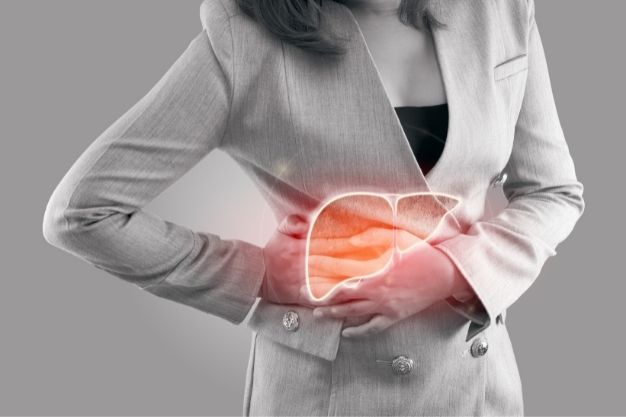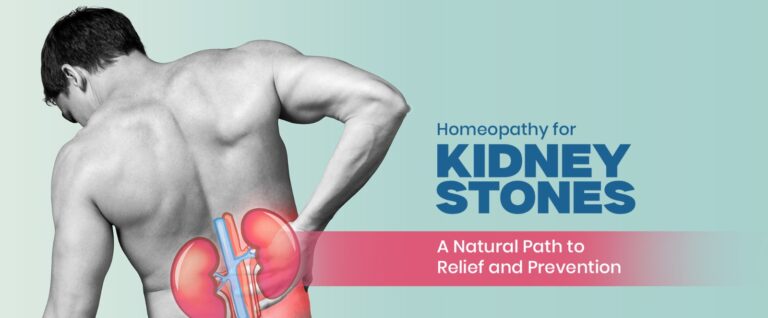Overview
The liver is a small organ the size of a football. It is located on the right side of your abdomen, close to your rib cage. The liver is necessary for digestion and removing toxins from the body. This page takes you towards treatment for liver disease with homeopathy medicine.
The disease of the liver can be handed down via generations (genetic). A range of things that affect the liver, such as infections, alcohol consumption, and obesity, can potentially cause liver disorders.
Over time, conditions that harm the liver can cause cirrhosis, which can progress to liver failure, a potentially fatal condition. However, early diagnosis may allow your liver to recover.
Your liver is your body’s biggest organ. It assists in food digestion, energy storage, and eliminating toxins from the body.
What exactly is liver disease?
Your liver is your body’s second biggest organ. ‘sIt roughly the size of a football and rests under your ribs on the right side. It’s the liver that separates them. It’s also generated bile, transports toxins from the body, and assists digestion.
Any of the various disorders that can affect your liver are referred to as “liver disease.” Cirrhosis can develop due to liver disease. The liver can no longer function when scar tissue replaces healthy liver tissue. If left untreated, liver disease can progress. Homeopathy treatment for liver failure is effective and safe.
There are several types of liver diseases:
- Virus-borne diseases such hepatitis A, B, and C
- Diseases induced by intoxicants or excessive alcohol consumption. Cirrhosis and fatty liver disease are two examples
- Hemochromatosis and Wilson disease are inherited disorders
- Swelling in the belly and legs, bruising easily, changes in the color of your feces and urine, and jaundice, or yellowing of the skin and eyes, are all symptoms of liver disease
- There are times when no symptoms are present. Imaging scans and liver function tests can detect liver damage and diagnosis, followed by treatment for liver diseases
What are the most common symptoms?
The signs of liver disorders may differ based on the underlying causes. It is also possible to have liver disease and not exhibit any symptoms. According to the experts, a few general signs might signal significant liver impairment.
These are some examples:
- Jaundice is identified by yellowish skin and eyes
- Stools that are pale, red, or black
- Ascites can cause an enlargement of the stomach, making it difficult to lie down or eat
- Encephalopathy is a brain disorder that causes significant mood, sleep, and cognition changes
Symptoms
Liver disease does not usually manifest itself in visible signs and symptoms. You may notice the following signs and symptoms if you have the liver disease:
- Yellowish-colored skin and eyes (jaundice)
- Pain and swelling in the abdomen
- Leg and ankle swelling
- Skin itch
- The urine color is dark
- Stools in a light color
- Chronic exhaustion
- Vomiting or nausea
- Appetite loss
- Tendency to bruise easily
When should you see a Homeopath?
Make an appointment with your Homeopath if you are concerned about any frequent signs or symptoms. If your abdomen discomfort is so terrible that you can’t sit still, get medical assistance from a homeopath. Treatment for liver disease may be treated with Dr. Care homeopathy as it is safe and natural.
If you have any of the below signs, you are advised to contact our expert:
- Color changes in your urine or feces
- Yellowing of the eyes, often known as jaundice
- Experiencing ache in the right upper side of the abdomen
- Swelling of the arms or legs
What are the queries I should ask my doctor?
You might wish to consult your Homeopath about the following:
- What lifestyle adjustments should I make to help maintain the health of my liver?
- What early indicators of liver disease should I look out for?
- Should I avoid any medications to avoid liver damage?
- Should my family seek genetic testing if I have inherited liver disease?
- Will I require a liver transplant?
Acute Liver Failure Causes
The following are some of the reasons for acute liver failure, which occurs when the liver fails quickly:
- Overdose of acetaminophen: It might harm your liver or cause it to fail
- Viruses: Including hepatitis A, B, and E, and the Epstein-Barr virus, cytomegalovirus, and herpes simplex virus can cause liver damage or cirrhosis
- Reactions to pharmaceutical and natural products: Some can destroy liver cells & other disturbances on the duct system that transports bile
- Eating deadly wild mushrooms: Toxins in Amanita phalloides, often known as the death cap, destroy liver cells and cause liver failure within a few days
- Autoimmune hepatitis: Similar to viral hepatitis, this disease in which your immune system assaults your liver can result in abrupt liver failure
- Wilson’s disease: This hereditary condition stops your body from excreting copper. It accumulates in your liver and destroys it
- Pregnancy-related acute fatty liver: Excess fat accumulates on your liver and harms it in this uncommon disease
- Septic shock: This excessive infection in your body can harm or even kill your liver
- Budd Chiari syndrome: This uncommon condition constricts and clogs the blood veins in your liver
- Toxins from industry: Many chemicals, including carbon tetrachloride, used as a cleanser and degreaser, might harm your liver
Chronic Liver Failure Causes
The following are the most prevalent causes of chronic liver failure:
- Hepatitis B: It causes your liver to enlarge and prevents it from functioning normally
- Hepatitis C: If you have had it for a long time, it might cause cirrhosis
- Long-term alcohol usage: It also contributes to cirrhosis
- Hemochromatosis: It is a hereditary disease in which your body absorbs and stores an excessive amount of iron. It can accumulate in your liver and lead to cirrhosis
Other conditions that might cause liver failure include as follows:
- Hepatitis A: Contact with hepatitis A-infected food or drink or an infected person can induce liver inflammation. This kind normally disappears on its own
- Hepatitis with autoimmunity: In this case, your body’s immune system, rather than a virus, targets and inflames your liver
- Cirrhosis: Drinking alcohol for a long time or having hepatitis can damage your liver, making it difficult or impossible for it to function
- Sclerosing cholangitis (primary): This condition gradually deteriorates your bile ducts. It primarily affects young guys.
- Oxalosis occurs when your kidneys cannot excrete calcium oxalate crystals through your urine
- Wilson’s disease: People with this uncommon genetic condition accumulate an abnormally large amount of copper in their brains and liver
- Deficiency of alpha-1 antitrypsin: This hereditary disorder can cause lung or liver disease
- Cancer of the liver: This is common in people who have had hepatitis B or C for a long time
- Adenoma of the liver: It occurs when benign liver tumors are found on a healthy liver. This is most common in women between the ages of 20 and 44
- Fatty liver disease (FLD): Extra fat cells might accumulate in your liver. People who are overweight, obese, or have excessive cholesterol are more likely to develop nonalcoholic fatty liver disease. Heavy drinkers are more likely to develop alcohol-related fatty liver disease
- Hepatitis caused by alcohol consumption: Inflammation of the liver caused by excessive or long-term drinking
- Alagille’s syndrome: A hereditary condition that causes the liver to have fewer bile ducts than normal
- PBC (primary biliary cholangitis): This condition gradually kills your tiny bile ducts. You may still hear it referred to as primary biliary cirrhosis
- Galactosemia: Galactose, a sugar in many foods, cannot be processed by people with this disease. It may harm the liver.
- Deficiency of lysosomal acid lipase (LAL-D): You can’t generate an enzyme called lysosomal acid lipase (LAL), which helps your body break down fats and cholesterol in your cells if you have this hereditary disease. As a result, lipids accumulate in your liver and cause harm
Liver Failure Complications
Doctors will attempt to avoid issues such as:
- Edema of the brain: Fluid accumulation is an issue with liver failure. In addition to your stomach, it can accumulate in your brain, causing high blood pressure
- Problems with blood clotting: Your liver is essential in assisting your blood to clot. When it can’t do that, you run the danger of bleeding too much
- Infections such as pneumonia and urinary tract infections: End-stage liver disease might increase your susceptibility to infections
- Failure of the kidneys: Liver failure can alter how your kidneys function, eventually leading to failure
Risk elements
The following conditions may increase your risk of liver disease:
- Excessive alcohol consumption
- Obesity
- Diabetes type 2
- Body piercings or tattoos
- Using shared needles to inject medicines
- Experimenting with other people’s blood and bodily fluids
- Sex without protection
- Excessive exposure to certain chemicals or poisons
- Family history of liver diseases
- Exposure to poisons or pesticides
- Taking certain vitamins or plants in high quantities
- Certain medicines should not be mixed with alcohol
- Taking a higher-than-recommended dosage of a medications
Treatment using Homeopathy
Treatment for liver diseases is mostly treatable if detected early. They can, however, inflict irreparable harm if not treated.
Cirrhosis, severe scarring that cannot be reversed, can result from the consequences of untreated or uncontrolled liver disease. If your cirrhosis has progressed to a point of no return, a liver transplant may be your last alternative.
Because certain liver disorders can develop without symptoms, scheduling annual physicals and the standard physical blood testing can help you and your doctor keeps one step ahead.
A balanced diet, physical activity, and other healthy lifestyle choices, such as reducing alcohol use, can also aid in prevention or control. Dr. Care homeopathy experts may support the sufferers in getting guidance on time and staying healthy.







